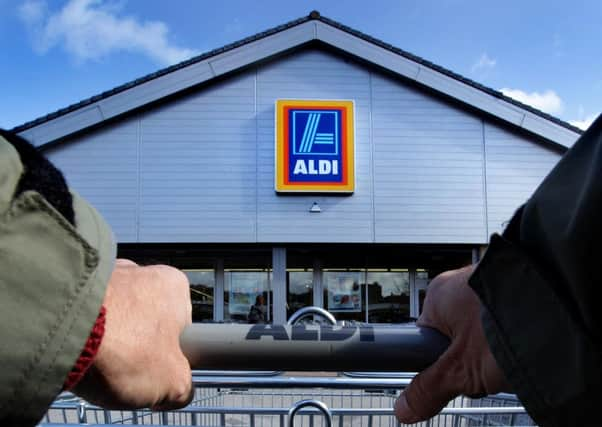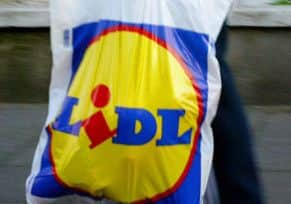Discount supermarkets have won the austerity battle, but the war continues


Some say success tastes sweet. Aldi and Lidl might argue that is has a definite touch of Branston Pickle.
You see, the aisles of the discount supermarkets worked out a long time ago how to satisfy middle class appetites. In the meat section of the Aldi store in Bramley on the outskirts of Leeds 21-day aged steak is currently going for £4.69 and should you be in desperate need of caramalised onion chutney, it’s right there just next to the regular mustard. It’s the same story over at its German rival Lidl, where just before Christmas frozen lobsters – a bargain at £5.99 – were doing a roaring trade.
Advertisement
Hide AdAdvertisement
Hide AdHowever, if there were ever a sign that Aldi has truly embraced the idiosyncrasies of its British customer base it’s perhaps the presence of the nation’s favourite pickle nestled among the more exotic brands. It’s 25 years since Aldi opened it’s first store in the UK and back then shoppers loyal to Sainsbury’s or Tesco would nip in only to pick up a particular bottle of Merlot a friend who knows about these things had recommended.


The rest of the produce seemed too eclectic to ever contemplate a weekly shop. Not now. While the ketchup is still Bramwells and the beans come courtesy of Corale, these days as well as Branston’s there’s Warbutons bread and Yorkshire tea. All of which goes some way to explain why the discount stores could be about to force the big four of Tesco, Sainsbury’s, Morrisons and Asda, into a full out price war.
“I’ve been shopping at Aldi and Lidl for a while,” says mother-of-two Helen Walker. “At first I’d pop in just to get cartons of juice for the children’s lunchboxes, but over the last year or so I’ve definitely started buying more. I tend to get as many basics here as I can, then top up with anything else we need at Tesco.”
Helen is part of the reason why Aldi and Lidl dramatically increased their market share over the Christmas period when £1 in every £14 spent on groceries went to the discount retailers. According to data analysts Kantar Worldpanel, the two brands took a 7.1 per cent share over the 12 weeks to January 5 compared to 5.8 per cent the year before. The research also confirmed that Bradford-based Morrisons was the big loser as the only business to see a fall in total sales.
Advertisement
Hide AdAdvertisement
Hide AdCathy Barnes is professor of retail innovation at Leeds Metropolitan University. Like Helen, she’s also typical of the 21st-century shopper alternating each week between Aldi and Sainsbury’s.
“I spend £50 less in Aldi, but they don’t have absolutely everything I want. Like a lot of people my tomato soup has to be Heinz, so does my ketchup and it’s those kind of things I go to Sainsbury’s for. However, over the years they have worked hard to expand their range and increase the number of recognisable brands. Aldi knows that if it scatters a few tried and tested names along its shelves it gives people confidence in the less recognisable product ranges.”.
Back in Bramley, it’s midday, midweek and the car park is busy. In one of the store’s windows there’s a large poster telling customers that consumer magazine Which? voted it Britain’s best supermarket for the second year running. Next to it are details of their latest offers – this week it’s cucumbers or spring onions for 39p along with a range of household goods. Quite how many people will take advantage of their contemporary mixer tap (£22.99) or portable steam cleaner (£15.99) is unclear, but it’s hard to argue with the prices. Forty dishwasher tablets for £3.99, 500g of lean beef mince for £2.99 and that’s all before the booze. There’s not a bottle of wine above £5.49, port will set you back just £6.29 and Champagne is a modest £12.99.
“In some ways, the big four have been the victims of their own success,” says Cathy. “They trained us to buy on promotion rather than brand, so much so that there are many people who don’t buy items like washing powder unless they are on offer. We don’t mind whether it’s Bold or Persil, what matters is that we think we are getting a good deal. The knock-on effect has made us less loyal as shoppers, we go to where the bargains are.
Advertisement
Hide AdAdvertisement
Hide Ad“The other key trend in grocery shopping is convenience and the huge footprints of some of the big four stores has worked against them. People can’t get in and out quickly enough and we have begun to rebel. Discount stores are much more compact. Yes, there may be only one kind of tomato ketchup, but lack of choice makes shopping more streamlined – you either take it or you don’t. Plus it’s good value and customers seem to be willing to accept that trade-off.”
All the major supermarkets are constantly looking at ways they can increase market share. Morrisons, which came late to the online market, is desperately trying to catch up with its rivals, while Tesco continues to plough ahead with new openings – with its first Harrogate store due to open in 2016 it is set to have a supermarket in every postcode in England. The claim may be impressive, but Philip Hesketh, a Harrogate-based psychologist who specialises in how businesses influence potential customers is not alone in wondering where the saturation point will come.
“Over the last 10 or 15 years, the big four and in particular Tesco have taken so much of the market share that it’s really difficult to know where future growth will come from,” he says. “You can’t help but wonder if they are suffering from fatigue. Harrogate is a prime example. There are 50,000 people living in the town which already has a Waitrose, Morrisons and Sainsbury’s, yet Tesco is absolutely determined to move in.
“Those big out-of-town stores are great for those who need to do the big weekly family shop, spending £200 a time, but they don’t necessarily cater for the majority. According to latest figures, families with a mum and dad and two children, account for less than four per cent of all households. A third of all households have either just one or two people living in them. They have very different shopping habits and it’s no longer possible to dismiss discount stores as appealing to a niche market.
Advertisement
Hide AdAdvertisement
Hide Ad“Most people don’t want cheap brands, but they do want brands cheap and that’s what Aldi and Lidl do really well.”
In the next few years, the German discounters have ambitious plans to open hundreds of new stores – today sees Pickering get its first Lidl. It’s a move which a few years ago might have caused outrage in the North Yorkshire market town, but its arrival, which will also create 16 part-time jobs, has largely been welcomed.
As one resident put it, “All people are wanting is a way of reducing their food costs. If a German firm can do that cheaper than an English company then it surely suggests that our big supermarkets need to up their game. The fact many of the big supermarkets have not realised the profits they were hoping for only goes to show that people are thinking about what they spend and it could help to make large companies reduce prices. They have had it too good for too long.”
The latest buzzword within the retail industry is “omnichannel” data whereby the supermarket can track customer trends whether they are shopping on a mobile, laptop or instore. The question is whether Aldi and Lidl, which currently don’t even allow credit cards, will be forced to follow suit.
Advertisement
Hide AdAdvertisement
Hide Ad“There is the old adage that if something ain’t broke, why fix it and that may well apply to Aldi and Lidl which have gradually grown in influence over recent years,” says Cathy. “However, it will be interesting to see what happens as the economy picks up.
“The discount stores filled an economic gap and they have prospered at least partly as a result of us watching our wallets and it will be interesting to see what happens when the economy picks up. Will we all start shopping at Waitrose? I tend to think not I think they have probably done enough to retain their customer base.”
And if they can just persuade Heinz to allow them to stock its tomato ketchup and baked beans then they might just have the sector sewn up.
Battle of the groceries
Waburtons Toastie loaf
Aldi: £1
Tesco: £1.45
Sainsbury’s: £1.45
Morrisons: £1.45
Asda: £1
Semi-skimmed milk (four pints)
Aldi: £1
Tesco: £1
Sainsbury’s: £1.39
Morrisons: £1.39
Asda: £1
Premium sausages (six pack)
Aldi: £1.99
Tesco: £3.29
Sainsbury’s: £3.20
Morrisons: £2.99
Asda: £2.78
Minced beef (500g)
Aldi: £2.99
Tesco: £3
Sainsbury’s: £4.50
Morrisons: £4
Asda: £3.95